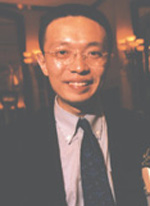I am very happy to announce that self-censorship, a phenomenon that has been disturbing the journalistic circle in Hong Kong for many years, is dead. As a matter of fact, it never existed.
Let’s be realistic. We should stop calling the sickness “self-censorship” and name it what it really is–censorship.
Front-line journalists seldom censor themselves. Their stories are usually killed by their superiors–plain old censorship. Chief editors, senior managers, and publishers do the dirty work for the government by watering down criticism or spiking offensive stories.
Look how editors treat the name for what happened on Tiananmen Square on June 4, 1989, for example.
A local television station recently issued a memo to its news staff: You may call it an incident or even a crackdown, but not a massacre. I still write down the word “massacre” almost every week. However, every time I do it is changed into “incident” or “event” by those above me in the editorial food chain. The rationale is that because Beijing claims no one was killed in the square itself, technically it is not correct to call it Tiananmen Square Massacre.
Or take a look at the Hong Kong’s provisional legislature, a body appointed by Beijing to replace the democratically elected Legislative Council under the British colonial administration. Few question its legality in print anymore. Beijing says it is legal. Case closed.
The Chinese people are well known, perhaps infamous, for mind-guessing: Do not wait until the master utters his order before performing your duty. That would be too late. Instead, do the right thing before being ordered to do so. This is another reason why “self-censorship” or censorship in the newsroom works.
Both before and after the Chinese takeover on July 1, Beijing did not explicitly have to threaten Hong Kong’s media to toe the line. If the newsroom bosses sense an approaching land mine, they simply shy away from it. Of course, the editors won’t tell you the real reason for doing so: “I’m too frightened to upset Beijing.” Instead there are other perfectly “legitimate” reasons to kill a story. It’s enough of an excuse to say, “There’s no substance” or “Readers are not interested.”
I would argue that this process has become routine and, sadly, few journalists choose to speak out. “There’s nothing we can do” is the prevailing attitude among the Hong Kong press. Gradually, they accept the situation. Before long, many won’t even admit that censorship exists. They just live with it.
Then there are the real culprits. The next time a foreign journalist comes to Hong Kong to explore the issue of “self-censorship,” he or she should go directly to the owners of media organizations. They are the real censors. Ask these tycoons what they own in China or how much they are planning to invest on the mainland.
Finally, we journalists can and should combat censorship by being more outspoken. We should blow the whistle whenever someone tries to silence us. This is our only hope. If we do not fight this battle, no one else will do it for us. The signs for success, however, are not promising. Chinese people are not well known for sticking their necks out, and I’m afraid journalists in general are no exception.
While the Chinese takeover has been surprisingly calm so far, it is still early. The government has not made any formal move to restrict press freedom, but we should be prepared. Article 23 of the Basic Law, Hong Kong’s mini-constitution, seems destined to haunt us. It says, “The Hong Kong Special Administrative Region shall enact laws on its own to prohibit any act of treason, secession, sedition, subversion against the Central People’s Government or theft of state secrets, to prohibit foreign political organizations or bodies from conducting political activities in the Region, and to prohibit political organizations or bodies of the Region from establishing ties with foreign political organizations or bodies.”
The first legislature, to be elected in May, will pass laws in these areas. Once enacted, those laws will become lethal weapons to suppress press freedom. Any inconvenient information can be branded a “state secret.” “Advocating” the independence of Tibet, Taiwan, or Hong Kong will be considered a great offense. The government might not have the media in mind when it writes the legislation, but press freedom definitely will be curtailed as a result.
On a larger scale, people get the kind of government they deserve. Journalists have to be at the forefront to defend press freedom, but without the support of the general public, we are doomed to fail. As consumers of information, readers must let publishers know that they treasure press freedom and won’t tolerate a soft, self-censoring media. If publishers insist on kowtowing to Beijing then the consumers must force them to pay an economic price at the newsstand. Only if publishers’ revenues drop will they get the message: Hong Kong deserves–and will fight for–press freedom.
Liu Kin-ming is the vice chair of the Hong Kong Journalists Association and is the opinion page editor of the Hong Kong Economic Times.
